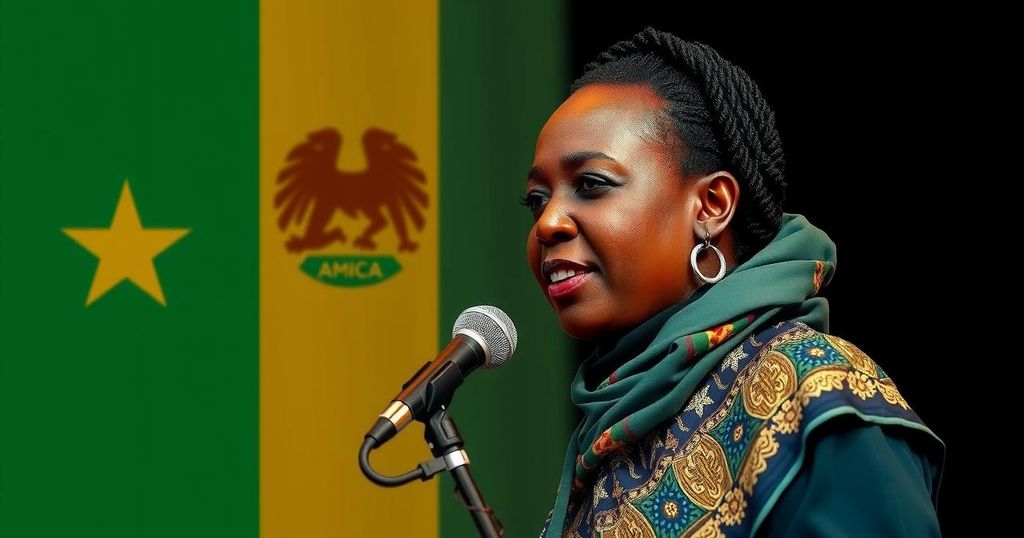Namibia’s Vice President Netumbo Nandi-Ndaitwah may become the country’s first female president in elections this Wednesday. Approximately 1.4 million Namibians are registered to vote, with Nandi-Ndaitwah’s party, SWAPO, facing competition from various opposition parties. Despite challenges from past corruption scandals, she has proposed significant reforms aimed at reducing youth unemployment and advancing women’s rights.
Namibia stands on the brink of a historic election as Vice President Netumbo Nandi-Ndaitwah vies to become the country’s first female president. The presidential election is scheduled for Wednesday, with approximately 1.4 million citizens registered to participate. Nandi-Ndaitwah, representing the South West Africa People’s Organization (SWAPO), has shown competitive polling results, demonstrating potential traction among the electorate.
Since gaining independence in 1990, SWAPO has maintained power in Namibia. However, the party experienced a significant setback in the 2019 elections, losing its two-thirds majority in the National Assembly due to corruption scandals linked to the fishing industry. Political analysts, including Henning Melber of the University of Pretoria, emphasize that SWAPO must heed the warning from past electoral outcomes to ensure a sustained connection with younger voters.
As a candidate, Nandi-Ndaitwah, age 72, has pledged to address the pressing issue of high youth unemployment, which currently stands at 20%. Her ambitious economic plan aims to generate over 500,000 jobs through a proposed investment of approximately 85 billion Namibian dollars ($4.7 billion) over the next five years. Furthermore, she intends to prioritize women’s rights, including reproductive health and equal pay, in her policy framework should she take office.
Should Nandi-Ndaitwah be elected, she will follow in the historic footsteps of other female African leaders such as Liberia’s Ellen Johnson Sirleaf, Malawi’s Joyce Banda, and Samba Panza of the Central African Republic. Political science lecturer Erika Thomas from the University of Namibia advocates that if entrusted with the presidency, Nandi-Ndaitwah must exhibit independence, transparency, and accountability, focusing on enhancing women’s participation in political processes.
The SWAPO party now faces challenging competition from opposition groups such as the Independent Patriots for Change, led by Panduleni Itula, and Job Amupanda’s Affirmative Repositioning movement. With elections across southern Africa indicating significant political shifts, the Namibian elections are poised to reflect or challenge these trends, as seen in neighboring countries like South Africa and Botswana, where longstanding parties have experienced losses.
The context of this historic Namibian election revolves around the potential induction of Netumbo Nandi-Ndaitwah as the first female president of Namibia. The current political landscape reveals SWAPO’s weakened dominance following serious internal allegations of corruption. With a substantial portion of the electorate being young voters, analysts recognize the critical importance of addressing their specific concerns and aspirations. The broader landscape across southern Africa suggests a moment of change, as various nations experience significant political shifts, which may influence the dynamics of this election.
The forthcoming elections represent a pivotal moment for Namibia, showcasing the potential for gender equity in leadership with Netumbo Nandi-Ndaitwah’s candidacy. As the election dynamics unfold, the country must assess how effectively political parties resonate with the electorate, particularly among younger constituents. Nandi-Ndaitwah’s ambitious promises regarding job creation and women’s rights would require robust legislative frameworks if she assumes the presidency. Thus, the outcome may not only alter Namibia’s leadership but also redefine its political trajectory in line with regional trends.
Original Source: abcnews.go.com







